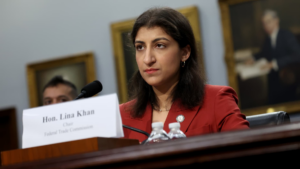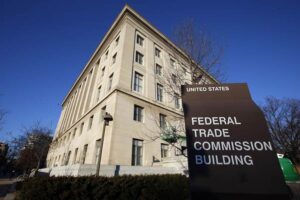The Federal Trade Commission (FTC) on Friday filed a lawsuit against three major U.S. health companies that negotiate insulin prices, accusing these drug middlemen of using tactics that boost their profits while “artificially” inflating costs for patients.
Here's ads banner inside a post
The lawsuit targets the three largest pharmacy benefit managers (PBMs) in the U.S.: UnitedHealth Group’s Optum Rx, CVS Health’s Caremark, and Cigna’s Express Scripts. According to the FTC, these companies are either owned by or affiliated with health insurers and collectively manage about 80% of the nation’s prescriptions.
The FTC’s lawsuit also includes each PBM’s affiliated group purchasing organization (GPO), which brokers drug purchases for hospitals and other healthcare providers. The agency also mentioned that in the future, it might sue drug manufacturers like Eli Lilly, Sanofi, and Novo Nordisk for their role in driving up insulin list prices.
A UnitedHealth spokesperson stated that the lawsuit represents “a profound misunderstanding of how drug pricing works,” emphasizing that Optum Rx has “aggressively and successfully” negotiated with drug manufacturers.
Here's ads banner inside a post
CVS also defended Caremark, stating they are “proud of the work” they have done to make insulin more affordable for Americans, and dismissed the FTC’s allegations as “simply wrong.” A spokesperson for Express Scripts criticized the lawsuit as another “troubling pattern from the FTC of unsubstantiated and ideologically-driven attacks” on PBMs.
PBMs play a central role in the U.S. drug supply chain, negotiating rebates with drug manufacturers on behalf of insurers, large employers, and federal health plans. They also create formularies—lists of medications covered by insurance—and reimburse pharmacies for prescriptions. The FTC has been investigating PBMs since 2022.
The FTC’s lawsuit argues that the three PBMs have established a “perverse” rebate system that prioritizes high rebates from drugmakers, leading to “artificially inflated insulin list prices.” It also claims that PBMs favor high-list-price insulins even when more affordable options are available.
Here's ads banner inside a post
The FTC is pursuing this case through its administrative process, initiating proceedings before an administrative judge who will hear the case.
“Millions of Americans with diabetes need insulin to survive, yet for many of these vulnerable patients, their insulin drug costs have skyrocketed over the past decade, in part due to the greed of powerful PBMs,” said Rahul Rao, Deputy Director of the FTC’s Bureau of Competition, in a statement.
“The FTC’s administrative action seeks to put an end to the Big Three PBMs’ exploitative conduct and marks an important step in fixing a broken system—a fix that could ripple beyond the insulin market and restore healthy competition to drive down drug prices for consumers,” Rao continued.
According to the FTC, roughly 8 million Americans with diabetes rely on insulin to survive, and many have been forced to ration the treatment due to high prices. President Joe Biden’s Inflation Reduction Act has capped insulin prices for Medicare beneficiaries at $35 per month, but this policy does not extend to patients with private insurance.
The Biden administration and Congress have increased pressure on PBMs, pushing for greater transparency in their operations as many Americans struggle to afford prescription drugs. According to a White House fact sheet, Americans pay two to three times more for prescription drugs than patients in other developed countries.

